|
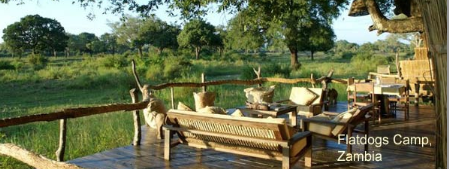
Walking with the lions
May 10, 2013
Zambia is fully engaged in the rehabilitation and
subsequent release of lions back into the wild. This is
not just an opportunity for the country to lend a hand
to Mother Nature by helping to preserve these majestic
animals, it is also a tourism opportunity for visitors
to have an up-close and personal experience with the
lions.
Lion Encounter operates stage one of the African Lion
and Environmental Research Trust's four stage
Rehabilitation and Release into the Wild Program. The
first stage of the program involves the young lions
being taken out into the Bush, allowing them to build
confidence in their natural habitat and practice their
hunting techniques before being released into stage two
of the program.
Joining the lions walks, participants are actively
assisting in the pre-release training for the cubs as
well as giving funding for ALERT to develop all stages
of the release program, implement conservation and
research programs to protect Africa's precious habitat
and wildlife, and engage in a variety of community
development and empowerment schemes for those living in
and around wildlife conservation areas.
For Lion Encounter Zambia, guests are collected from
their lodges and comfortably transported a short
distance to the Boma - a hospitality suite overlooking
the Zambezi River within the Mosi-oa-Tunya National Park
- where a friendly hospitality team is waiting to greet
participants with a welcome soft-drink or teas and
coffees for the early risers, after which they are shown
to their seats.
Guests enjoy a short film to give them information on
the lion release program, and the film explains why it
is necessary to facilitate such a project. It also shows
guests some behind the scenes footage regarding ALERT's
others efforts, which benefit communities bordering
conservation areas run by the ALERT Communities Trust
(ACT) and its other wildlife conservation and research
programs through the Conservation Centre for Wild Africa
(CCWA).
All participants of the walk then receive the
all-important dos and don'ts in a safety talk delivered
by their guide. Guests are then ready to meet the lions
who are already waiting for them in the Bush.
During the walk itself, guests will be accompanied by
experienced guides, handlers, and scouts that ensure
rigorous safety procedures are upheld, allowing guests
to enjoy watching the lions play, hunt, and enjoy their
natural habitat. At times, the lions may rest, allowing
guests for some close encounters and opportunities to
get a photo with the lions. Guests’ experiences will be
enhanced by hearing about the lion as a species as well
as receiving the latest updates on the progress of the
release program.
For more information, visit the Zambia Tourism Board
website:www.zambiatourism.com .
Wildlife
Safaris in Zambia's National Parks
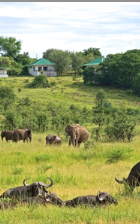 One
of the highlights of your trip to Zambia for the
ATA Marketing Congress or any occasion, will be the
opportunity to explore it's vastness, which
includes a fine selection of National Parks and
wilderness areas.
The chance to discover
truly unexplored regions of Africa's subcontinent
are yours. Safari opportunities in Zambia abound!
Whether on foot, by boat or canoe, on horseback,
micro light or by open vehicle, Zambia offers
mountains of the real Africa. Bordered by Namibia,
Botswana, Zimbabwe, Malawi, Tanzania and
Mozambique, Zambia lies at the heart of the
subcontinent, It is untainted by mass tourist
development and offers up unsurpassable natural
beauty to those who choose to delve into its
timeless origins. You can choose from luxurious
lodges or camps that blend in with the surroundings
for a hospitable stay in any of Zambia's national
parks. One
of the highlights of your trip to Zambia for the
ATA Marketing Congress or any occasion, will be the
opportunity to explore it's vastness, which
includes a fine selection of National Parks and
wilderness areas.
The chance to discover
truly unexplored regions of Africa's subcontinent
are yours. Safari opportunities in Zambia abound!
Whether on foot, by boat or canoe, on horseback,
micro light or by open vehicle, Zambia offers
mountains of the real Africa. Bordered by Namibia,
Botswana, Zimbabwe, Malawi, Tanzania and
Mozambique, Zambia lies at the heart of the
subcontinent, It is untainted by mass tourist
development and offers up unsurpassable natural
beauty to those who choose to delve into its
timeless origins. You can choose from luxurious
lodges or camps that blend in with the surroundings
for a hospitable stay in any of Zambia's national
parks.
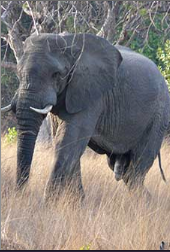 Kafue
National Park Kafue
National Park
Only two
hours to the west of Lusaka, Kafue National Park
is, at 22,500 square kilometers, one of the largest
and most diverse wilderness reserves in Africa. The
Lufupa and Lunga tributaries of the kafue river are
the core of its watershed system and flow into the
park from the north. The Kafue consists of open
grassy plains, miombo and mopane woodland, and
patches of Zambezi teak, and is best known as home
to elephant, buffalo, red lechwe, cheetah, roan and
sable. Over 400 different species of birds have
been recorded in the Kafue Flats area
alone.
The
Luangwa river valley
Considered by many to be one of the most
prestigious wildlife sanctuaries anywhere on earth,
the South Luangwa National Park is one of beautiful
riverine woodland, replete with a vast range of
large game mammals. Elephant and lion are numerous
as are large numbers of antelope. Naturally
occurring are Thornicroft's giraffes, particular to
this valley region. Nile crocodile are more
abundant in the Luangwa River than any other river
in Zambia.
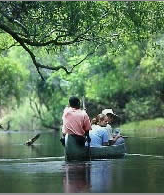 The
less renowned North Luangwa National Park is the
epitome of the remote wilderness area but access is
limited only to licensed tour operators. The
less renowned North Luangwa National Park is the
epitome of the remote wilderness area but access is
limited only to licensed tour operators.
Kasanka
One of the country's smallest national parks,
it has been managed privately since 1990 with the
profits from tourism directed back into the
community. It boasts no less than eight lakes and
four rivers, which offer spectacular wetland game
species, fish and birdlife. Small pockets of swamp
forest can be found as well as the million fruit
bats that come to roost during the rainy
season.
Lochinvar
This small game park boasts over 3,000 lechwe
antelope as well as a bird refuge sheltering an
estimated 428 species, including a number of rare
breeds.
Sumbu
National Park
During
the dry season, herds of elephants can be found in
Sumbu on the 80 kilometer shoreline of Lake
Tanganyika's which includes sandy beaches, vertical
cliffs and rocky coves. This 2,020 sq. km park
offers a diverse range of wildlife, including
hartebeest, buffalo, zebra, lion and leopards. It
is an excellent viewing platform for flamingo
during their migrations, as well as an angler's
paradise.
Lower
Zambezi
Downstream
from Victoria Falls, this relatively new national
park is a superb location for big game viewing
along the breathtaking Zambezi River. Canoe safaris
are a popular means of getting up close to
elephant, hippo and buffalo, just to name a few, do
be aware, however, of the large crocodiles which
also inhabit its waters!
Nyika
Plateau
The Great Rift Valley provides the backdrop for
magnificent tropical Alpine flora found in this 80
sq. km park, a scenic high plateau more than 2,000
meters above sea level. Flower enthusiasts will
enjoy the bounty of orchids to be discovered, while
ornithologists will be overwhelmed with the flood
of migratory birds, particularly in November and
December.
Bangweulu
The
Bangweulu Floodplains in Zambia's remote northern
reaches are a watery wilderness home to millions of
birds feasting in its nutrient rich shallows,
including the very special shoe bill stork. It also
attracts the endemic black lechwe antelope by the
thousands &endash; a real sight to see.
Chete
Island wildlife and bird sanctuary
Two
islands, about 160 km upstream from the dam wall at
Lake Kariba, form this isolated park and wildlife
estate: Chete and Sekula. Safari camps have only
recently been established and afford the wildlife
enthusiast the untouched beauty of Zambezi Valley
wildlife and surrounding scenery.
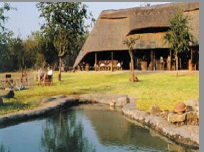 The
Africa Travel Association in cooperation with the
Zambia National Tourist Office, is providing the
photos and information in this section on Zambia as
a preview of what the hundreds of delegates from
North America, other African countries and around
the world can expect when they visit Zambia before,
during and after this year's International
Marketing Congress. From its National Parks and
vast wilderness areas to the host cities of Lusaka
and Livingstone, we know it will be an
unforgettable journey and an outstanding event and
learning experience. If you have items on any
aspect of travel and lifestyle in Zambia, please
send to africatravelasso@aol.com. The
Africa Travel Association in cooperation with the
Zambia National Tourist Office, is providing the
photos and information in this section on Zambia as
a preview of what the hundreds of delegates from
North America, other African countries and around
the world can expect when they visit Zambia before,
during and after this year's International
Marketing Congress. From its National Parks and
vast wilderness areas to the host cities of Lusaka
and Livingstone, we know it will be an
unforgettable journey and an outstanding event and
learning experience. If you have items on any
aspect of travel and lifestyle in Zambia, please
send to africatravelasso@aol.com.
Above
material and images have been supplied for use by
the Africa Travel Association courtesy of the
Zambia National Tourist Board
www.zambiatourism.com

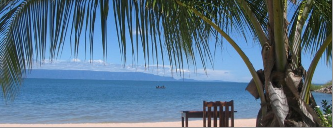

|

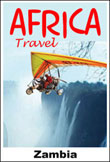

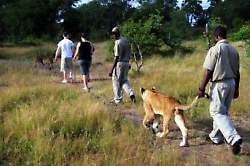
 One
of the highlights of your trip to Zambia for the
ATA Marketing Congress or any occasion, will be the
opportunity to explore it's vastness, which
includes a fine selection of National Parks and
wilderness areas.
The chance to discover
truly unexplored regions of Africa's subcontinent
are yours. Safari opportunities in Zambia abound!
Whether on foot, by boat or canoe, on horseback,
micro light or by open vehicle, Zambia offers
mountains of the real Africa. Bordered by Namibia,
Botswana, Zimbabwe, Malawi, Tanzania and
Mozambique, Zambia lies at the heart of the
subcontinent, It is untainted by mass tourist
development and offers up unsurpassable natural
beauty to those who choose to delve into its
timeless origins. You can choose from luxurious
lodges or camps that blend in with the surroundings
for a hospitable stay in any of Zambia's national
parks.
One
of the highlights of your trip to Zambia for the
ATA Marketing Congress or any occasion, will be the
opportunity to explore it's vastness, which
includes a fine selection of National Parks and
wilderness areas.
The chance to discover
truly unexplored regions of Africa's subcontinent
are yours. Safari opportunities in Zambia abound!
Whether on foot, by boat or canoe, on horseback,
micro light or by open vehicle, Zambia offers
mountains of the real Africa. Bordered by Namibia,
Botswana, Zimbabwe, Malawi, Tanzania and
Mozambique, Zambia lies at the heart of the
subcontinent, It is untainted by mass tourist
development and offers up unsurpassable natural
beauty to those who choose to delve into its
timeless origins. You can choose from luxurious
lodges or camps that blend in with the surroundings
for a hospitable stay in any of Zambia's national
parks. Kafue
National Park
Kafue
National Park The
less renowned North Luangwa National Park is the
epitome of the remote wilderness area but access is
limited only to licensed tour operators.
The
less renowned North Luangwa National Park is the
epitome of the remote wilderness area but access is
limited only to licensed tour operators. The
Africa Travel Association in cooperation with the
Zambia National Tourist Office, is providing the
photos and information in this section on Zambia as
a preview of what the hundreds of delegates from
North America, other African countries and around
the world can expect when they visit Zambia before,
during and after this year's International
Marketing Congress. From its National Parks and
vast wilderness areas to the host cities of Lusaka
and Livingstone, we know it will be an
unforgettable journey and an outstanding event and
learning experience. If you have items on any
aspect of travel and lifestyle in Zambia, please
send to
The
Africa Travel Association in cooperation with the
Zambia National Tourist Office, is providing the
photos and information in this section on Zambia as
a preview of what the hundreds of delegates from
North America, other African countries and around
the world can expect when they visit Zambia before,
during and after this year's International
Marketing Congress. From its National Parks and
vast wilderness areas to the host cities of Lusaka
and Livingstone, we know it will be an
unforgettable journey and an outstanding event and
learning experience. If you have items on any
aspect of travel and lifestyle in Zambia, please
send to 

